Coconut water – the ultimate elixir for the tropics

As we made our way back from Pantai Kerachut on a sweltering afternoon, my companions and I found ourselves pondering over the ideal beverage to satiate our thirst after an arduous hike, steering clear of the usual carbonated options. After careful consideration, we unanimously opted for one of Mother Nature's marvels – the refreshing, locally abundant coconut water in Penang. With a newfound resolve, we swiftly made our way to the nearest nondescript roadside stall that offered this delightful thirst-buster, located just beyond the exit of the national park in Teluk Bahang.
We savored tall glasses of coconut water, chilled with ice and slightly sweetened with some syrup. Each sip of this invigorating drink was truly refreshing. In the glasses, there were also thin sheets of young coconut flesh that just melted in every mouthful. In that moment, I could not have asked for a more gratifying beverage than the one we had just indulged in.
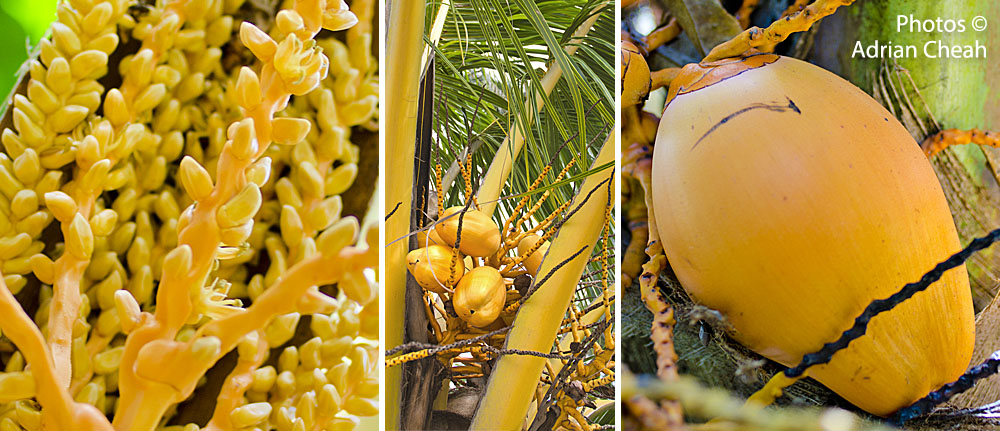
The coconut palm (Cocos nucifera) produces a remarkable fruit known as the coconut, aptly named for its origin. Derived from the Spanish and Portuguese word "coco," meaning "monkey," this moniker finds its roots in the peculiar appearance of the fruit. The three distinctive indentations at its apex bear an uncanny resemblance to the countenance of a mischievous primate, lending the fruit its playful nickname. The botanical epithet "nucifera" further accentuates its nature as a nut-bearing wonder.
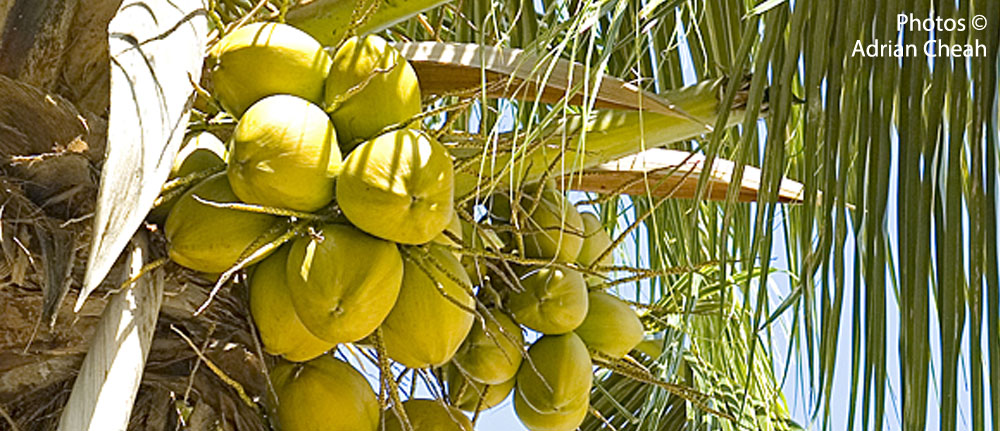
Did you know that in the botanical world, the largest seeds ever discovered belong to the coconut? Interestingly, what we commonly refer to as "coconut water" serves as a complete source of vital nutrients for the seed, facilitating its transformation into a flourishing seedling. In a way, it parallels the nourishing role of an egg yolk in the development of an embryo. This revelation highlights the immense potency and nutrient richness that coconut water embodies.
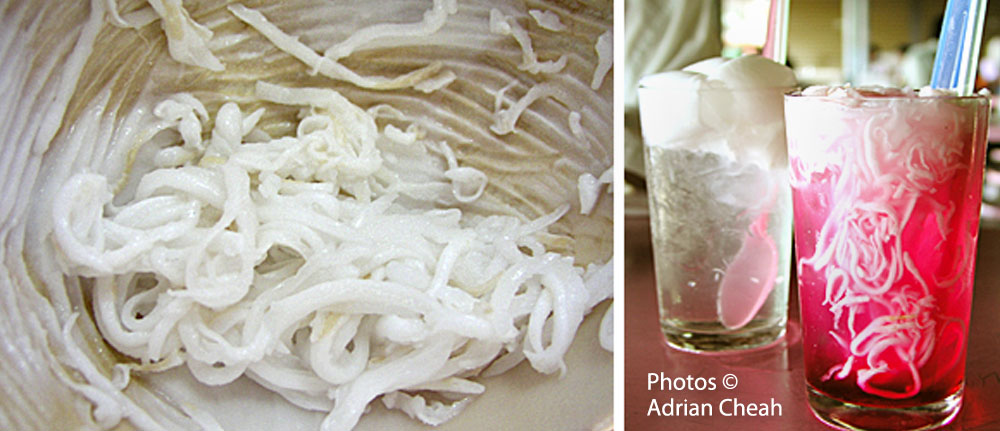
Being a tropical haven, Penang is blessed with an abundant supply of fresh coconuts, sourced from local plantations within the state as well as from neighbouring states such as Kedah, Perak and Selangor. Some varieties are also imported from Thailand and Indonesia, adding to the diversity of coconut options available. While preparing coconut water is a straightforward process, Penang offers a multitude of delightful ways to savour this tropical beverage. Whether you prefer it in its pure, unadulterated form, sweetened or unsweetened, served chilled or at room temperature, straight from the fruit or poured into a glass, the choice is yours. A popular variation involves a hint of sweetness, achieved by adding a red rose-flavoured syrup (or pandan-flavoured), accompanied by strands of grated coconut flesh that beautifully resembles white noodles, locally known as "kelapa sagat" in Malay. This harmonious combination adds a delightful twist to the overall coconut water experience.

Amidst the array of varieties on offer, my personal favourite among all is the aromatic pandan coconut. At times, due to the high demand for this coveted variety within Malaysia, the local supply may fall short. In such cases, the aromatic pandan coconuts are imported from our neighbouring Thailand.
Is there any downside to indulging in the goodness of coconut water? Well, some caution that its diuretic properties may lead to mineral loss in the body. Additionally, there are individuals, like my Mum, who hold the belief that consuming excessive amounts of coconut water on a daily basis can result in weakened knees, as expressed in the Hokkien phrase "nooi kha hong." Whether this notion holds any truth or is merely a grandmother's tale, it remains uncertain and open to interpretation.
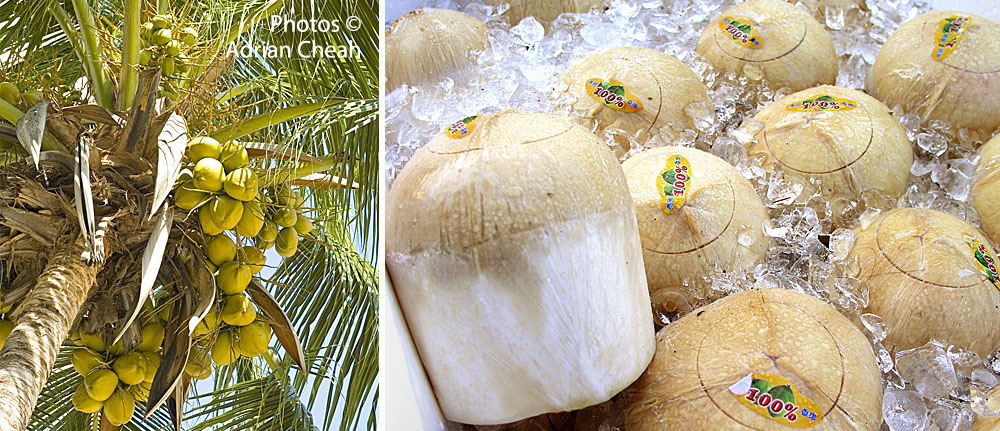
The "cool stuff" in coconut water
Coconut water is not just a refreshing drink but a treasure trove of essential nutrients. Let us delve deeper into the remarkable qualities of this natural elixir.
Despite its seemingly transparent and clear appearance, coconut water is a nutritional powerhouse. It brims with phytonutrients, vitamins, and minerals, making it a true gift from nature. Magnesium, potassium, sodium, iron, calcium, dietary fibres and vitamins B1, B2, and C are among the valuable elements it offers. Remarkably, coconut water is low in fat and devoid of cholesterol or uric acid, making it a guilt-free indulgence.

The energising power of sugar and vitamin B, found abundantly in coconut water, makes it an excellent stress buster. Its diuretic property aids in removing toxins and it is touted as a blood purifier. With these remarkable qualities, coconut water has the potential to become the next sought-after product in the lucrative market of "sports beverages". Its unique combination of benefits makes it a compelling contender for those seeking a revitalising and health-conscious hydration option.
Did you know that coconut water doubles as a natural tonic for the skin, providing hydration and nourishment when applied topically? Furthermore, the versatile coconut finds its way into various cosmetic, toiletry, and shampoo products. Even well-known brands like The Body Shop offer a captivating coconut perfume, boasting a warm and sweet fragrance that appeals to women seeking comforting and exotic scents. Biondetta's Sinfully Good Skincare range also features a perfume called Coconut Cravings, further showcasing the allure of this tropical aroma.
For health-conscious individuals, it is worth noting that the delightful young coconut meat is both cholesterol-free and low in fat, making it a guilt-free indulgence. On the other hand, the mature coconut flesh contains saturated fats, triglycerides, and some monounsaturated fats, while remaining cholesterol-free. Extracted from the grated flesh, santan, also known as coconut milk, holds an essential place in local cuisine, particularly in curries, Nyonya kuih and various traditional dessert broths. Its rich and creamy texture enhances the flavours of these beloved dishes, creating a delightful culinary experience.
Where to buy fresh coconut water
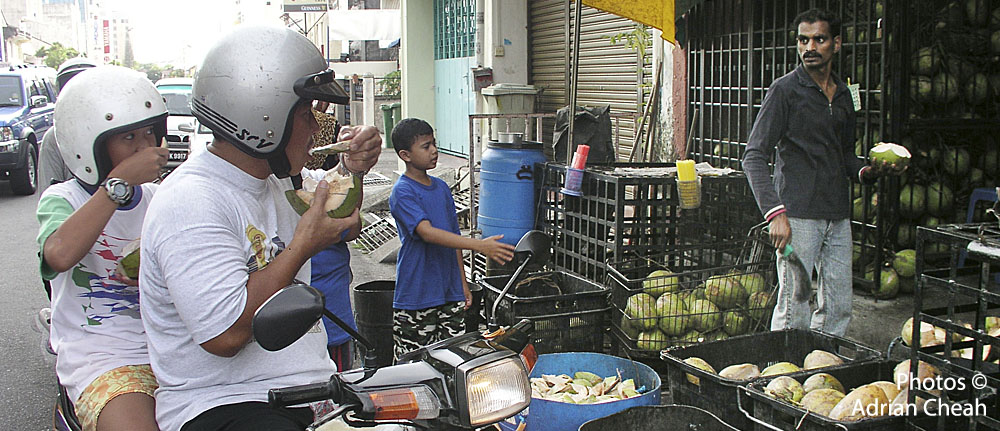

Fresh coconut water can be easily found at roadside stalls scattered throughout Penang, as well as at food courts and select restaurants. You can also buy it from wholesalers such as Anba Coconut at the end of Lorong Abu Siti (off Jalan Burmah). This well-stocked shop attracts a steady stream of customers throughout the day, ensuring a constant supply of fresh coconuts.
In addition to physical stores, most supermarkets also carry coconuts, often pre-husked and attractively shrink-wrapped. They are conveniently available for purchase, allowing you to enjoy the refreshing beverage at your convenience. Furthermore, with the rise of online delivery services like Foodpanda, GrabFood, and Delivery Eat, you can have fresh coconut water delivered right to your doorstep with just a few clicks.
If you are feeling adventurous, explore the internet for enticing recipes that incorporate coconut water. From making delicious coconut jelly to adding it to cocktails or even experimenting with cooking, you might stumble upon new and delightful flavours that could pleasantly surprise you.
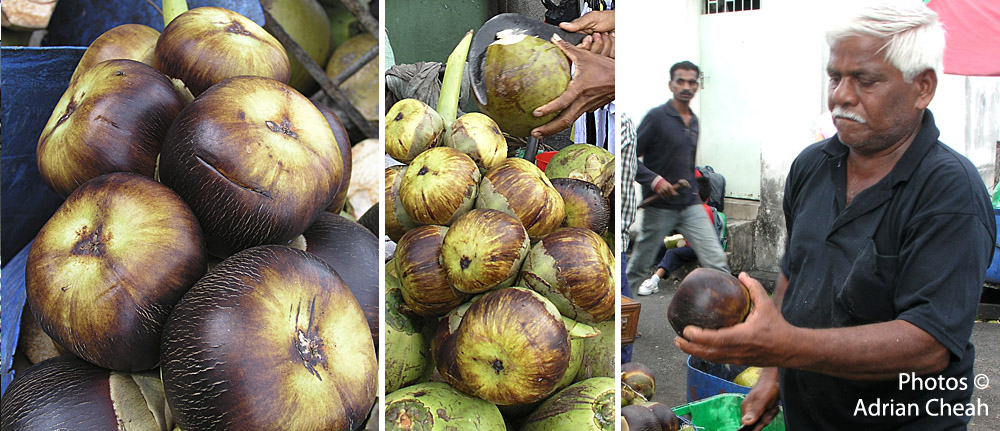
Fresh sea coconuts, a slightly distinct variety, can be found at the Pulau Tikus market in the mornings, as well as certain wet markets and supermarkets. These smaller fruits are sought after for their nearly translucent flesh, which offers a delightful crunch with every bite. When purchasing them, the vendor will expertly de-husk the fruit and pack the pods for your convenience. To savour the sea coconut, carefully remove the soft brown skin to reveal the enticing flesh within.
In culinary circles, some cooks add sea coconut in a delectable dessert that features snow fungus, red dates, and dried longan. The combination of these ingredients results in a delightful and nourishing sweet treat. If you prefer the convenience of a canned version, supermarkets often carry sea coconuts that have been sweetened with sugar, resulting in a pleasing gloden-brown hue.
Further use of coconut water
Beyond its culinary and skincare uses, coconut water finds its utility in the agriculture industry. Its unique properties make it an ideal growing medium in tissue culture, serving as an effective growth regulator. Coconut water contains valuable compounds such as nicotinic acid, auxin, gibberellin, pyridoxine and thiamine, which contribute to its growth-promoting capabilities. In fact, research has indicated that applying coconut water to tea cuttings may enhance the success of root development.
Saving lives?
I vividly recall a scene from the movie "Who Am I" starring Jackie Chan, where his character ingeniously fashioned an improvised intravenous (IV) procedure using a coconut and tubing to administer fluids to an injured buggy racer in the African wilderness. However, the medical feasibility of such a life-saving stunt raises questions.
An article published in the American Journal of Emergency Medicine in January 2000, reported a case in which electrolyte balance was successfully restored in a patient by treating him with an IV of coconut water, which flowed directly from the coconut.
An article published in the American Journal of Emergency Medicine in January 2000 documented a case in which a patient's electrolyte balance was successfully restored by administering an IV of coconut water directly sourced from the coconut itself.
This finding gives credence to stories from the Pacific War of 1941-45, suggesting that soldiers from opposing forces utilised coconut water, extracted directly from the fruit, as a makeshift plasma transfusion when IV saline solutions were scarce. Consequently, coconut water has been dubbed "fluid of life."
Nevertheless, Mark Graber, a professor of clinical emergency medicine at the University of Iowa Carver College of Medicine, cautions against considering coconut water as an optimal IV solution for rehydration. He points out that coconut water lacks sufficient sodium content to remain in the bloodstream effectively. Additionally, he warns of potential risks associated with elevated levels of calcium and potassium that could arise from its use.
While the concept of coconut water as an emergency IV solution sparks intrigue, it is essential to heed medical experts' advice and rely on scientifically validated methods for life-saving procedures.
Cleansing the soul
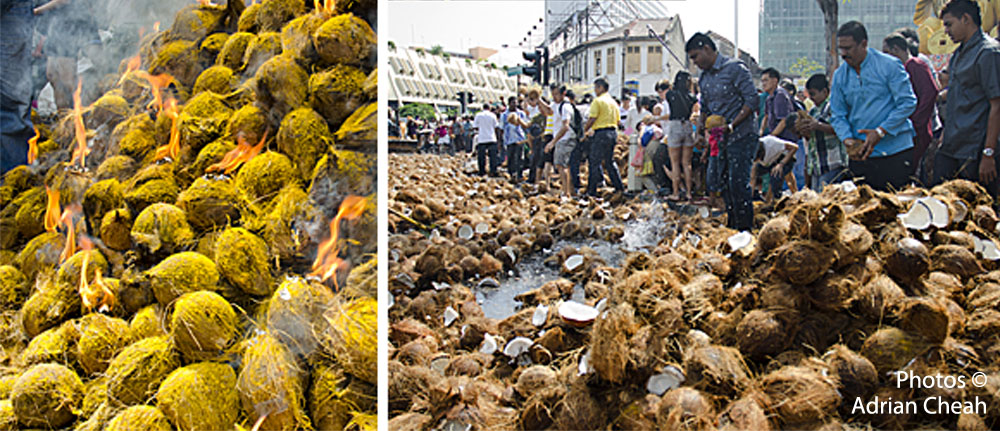
During the Thaipusam festival in Penang, thousands of devotees seeking blessings, line the route of the silver chariot bearing the sacred statue of Lord Murugan. They smash coconuts on the roads as the chariot approaches, a symbolic act of purification to cleanse the chariot's path as well as their souls. Done with full devotion, devotees surrender their ego by smashing them at the feet of the Lord to reveal purity within. The coconut water represents abundance and the white flesh, a symbol of purity reborn.
During the vibrant Thaipusam festival in Penang, countless devotees gather along the route of the resplendent silver chariot carrying the sacred statue of Lord Murugan. As the chariot progresses, an awe-inspiring ritual unfolds: the devotees, driven by their fervent devotion, smash coconuts onto the roads. This act holds profound symbolism, signifying both the purification of the chariot's path and the cleansing of their own souls.
Through the act of smashing coconuts, devotees wholeheartedly surrender their egos, humbly offering the shattered pieces at the feet of the Lord. In doing so, they aspire to reveal the innate purity within themselves. The coconut water, representing abundance and nourishment, mirrors the devotees' yearning for spiritual fulfillment. Additionally, the white flesh of the coconut embodies the profound symbolism of a rebirth, signifying the emergence of a purified and virtuous existence.
Conclusion
The next time you decide on what to drink to slake your thirst, consider the nourishing and health-enhancing qualities of coconut water, rather than reaching for sugar-laden soda pops. Not only will the “dew from the heavens” (as Hawaiians would call it) moisten parched throats, it will beautify, soothe and cleanse, just like a complete therapeutic treatment all rolled into one!
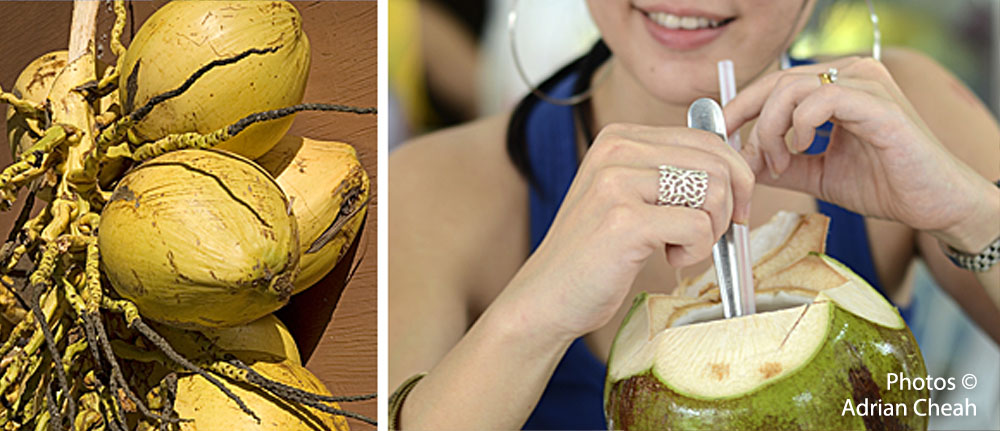
PS: Go coconuts for coconuts on World Coconut Day, celebrated on 2 September annually since 2009. The aim of the celebrations is to bring coconuts into the spotlight and recognise their importance and benefits — not just health-wise but economically as well.
---------------------------------------------------------
Written and photographed by Adrian Cheah
© All rights reserved
Updated 3 July 2023